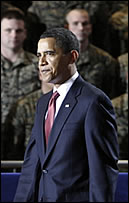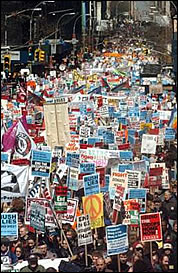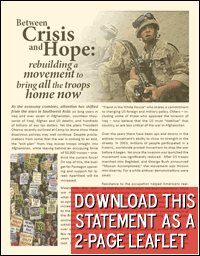Posted March 17, 2009
As the economy crumbles, attention has shifted from the wars in Southwest Asia: six long years in Iraq and over seven in Afghanistan, countless thousands of Iraqi, Afghan and US deaths, and hundreds of billions of our tax dollars. Yet the plans President Obama recently outlined at Camp Le Jeune show these disastrous policies may well continue. Despite proclamations from some that the war is coming to an end, the “exit plan” from Iraq moves troops straight into Afghanistan, while leaving behind an occupying force of 50,000 troops – one-third the current force! On top of this, the budget for Pentagon spending and support for Israeli Apartheid will be increased.
Meanwhile, the antiwar movement is not what it once was: even as opinion polls register increasing opposition to the war, March 21 is the first national demonstration demanding withdrawal from Iraq in over one year. Why? A few reasons: after eight years of Bush, many look to Obama as a “friend in the White House” who shares a commitment to changing US foreign and military policy. Others – including some of those who opposed the invasion of Iraq – now believe that the US must “stabilize” that country, or are less critical of the war in Afghanistan.
Over the years there have been ups and downs in the antiwar movement’s ability to show its strength in the streets. In 2003, millions of people participated in a historic, worldwide protest movement to stop the war before it began. Yet once the invasion was launched the movement was significantly reduced. After US troops marched into Baghdad, and George Bush announced “Mission Accomplished,” the movement was thrown into disarray. For a while antiwar demonstrations were small.

Resistance to the occupation helped Americans realize that Bush’s declaration had been premature. More and more people began coming back into the streets, an antiwar veterans’ movement took shape, and students, communities, and union members organized on a local level. Throughout these ups and downs, a core of antiwar activists continued the essential work of educating, organizing and mobilizing others to keep this movement alive.
The massacre in Gaza, unleashed by the Israeli army just before Obama’s inauguration, adds a new element to the urgency of reviving antiwar activism. It horrified tens of thousands who protested in dozens of actions across the country. The role of young people in organizing demonstrations, vigils and teach-ins dramatically expanded the Palestine solidarity movement in the U.S.
We believe that another revival of antiwar activism can happen. But it will be a movement that is more about U.S. occupation in Southwest Asia and complicity with Israeli aggression than an antiwar movement opposing one specific war. There is no “good” war in Afghanistan and “bad” war in Iraq: both are foreign occupations those populations reject.
Many antiwar groups essentially shut down all activity in 2008 to work at getting out the “peace vote” – meaning votes for Democratic Party candidates – even though they support the continued occupation of Iraq, expanding the military, and boosting troop levels in Afghanistan, not to mention Israel. While we share everyone’s delight that Bush and his policies are gone, the subordination of political principles and focused grass-roots organizing to political expediency doesn’t solve the fundamental problem.
It’s important that we rebuild local antiwar groups on an independent basis, accountable to the demand of immediate withdrawal from both Iraq and Afghanistan. Just as the Gulf War and economic sanctions devastated Iraqi society and paved the way for the invasion six years ago, the United States has long played a destructive role in Afghanistan, hungry for access to Central Asian energy reserves and a military outpost on China’s western border.
Clearly, Afghanistan has been the graveyard of all foreign invaders in the past. It’s hard to imagine that the present beefed-up U.S. force won’t face a similar fate. As Iraq showed, bombing a country into submission is one thing: occupying it is another. Liberation can never be delivered from an invading army! Or, in the words of Shukria Barakzai, a member of Afghanistan’s parliament: “don’t send more troops – it will just bring more violence.”
What are our tasks in rebuilding the movement?
- strengthening the grass-roots of the movement among veterans, soldiers and military families, in unions and communities, and on campuses;
- organizing united, mass demonstrations that clearly demand “Out of Iraq & Afghanistan Now!” and
- educational work about the reality of the wars and occupations, along with connecting Iraq and Afghanistan to Israel/Palestine.

Crucial to our organizing is a campaign to end U.S. military arms to Israel, including the white phosphorus that was illegally used in Gaza. Already, in the wake of Gaza, public criticism of US military aid to Israel has become more open. Arab-American and Muslim communities in many places mobilized like never before, and the identification of American Jews with the state of Israel has begun to slip. Taking inspiration from the victorious movement against South African apartheid, a campaign of boycott, divestment, and sanctions against the Zionist apartheid policies has started to take shape.
It will also be a different antiwar movement in another way, because of the economic meltdown. The fact is that those of us who live within the empire cannot afford to pay in dollars or in lives for U.S. foreign policy. As long as military spending sucks up nearly half the total budget there can’t be good-paying jobs that rebuild our infrastructure, educate our young or provide decent health care for all.
But in the midst of the economic crisis, too, people are more open to questioning the glories of the market and less willing to die for an empire that enforces it. The antiwar movement has a unique opportunity to demand a “people’s bailout” for all of these things – while pointing out that the military budget starves resources for these critical needs.
One significant opportunity to make these links will be on April 4 in New York City, where United for Peace and Justice is projecting a major demonstration under the theme “Beyond War, A New Economy is Possible: Yes We Can!” We need to mobilize again in NYC to build a militant, “US Out of Iraq and Afghanistan! End the Occupation of Palestine!” contingent in UFPJ’s march.
Produced by the Anti-War Working Group of SOLIDARITY: a revolutionary socialist, feminist, anti-racist organization.

